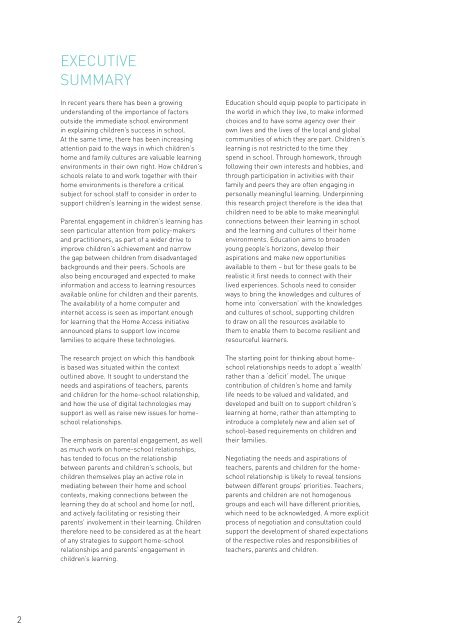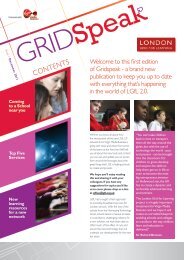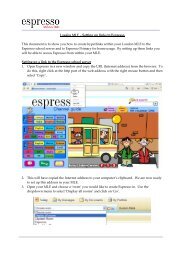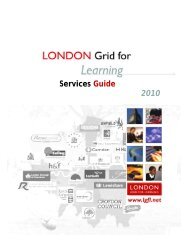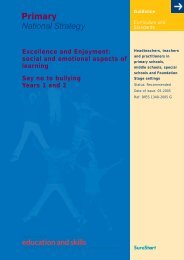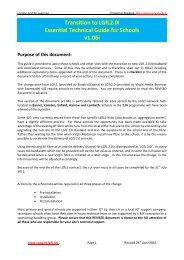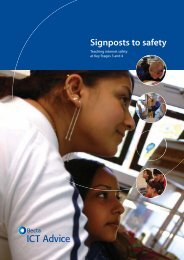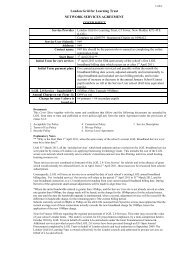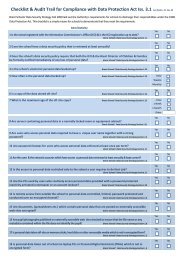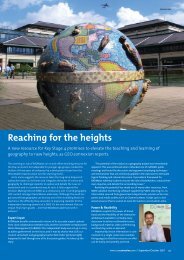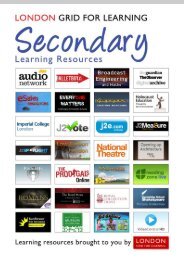Developing the home-school relationship using digital ... - Futurelab
Developing the home-school relationship using digital ... - Futurelab
Developing the home-school relationship using digital ... - Futurelab
- No tags were found...
Create successful ePaper yourself
Turn your PDF publications into a flip-book with our unique Google optimized e-Paper software.
EXECUTIVE SUMMARYIn recent years <strong>the</strong>re has been a growingunderstanding of <strong>the</strong> importance of factorsoutside <strong>the</strong> immediate <strong>school</strong> environmentin explaining children’s success in <strong>school</strong>.At <strong>the</strong> same time, <strong>the</strong>re has been increasingattention paid to <strong>the</strong> ways in which children’s<strong>home</strong> and family cultures are valuable learningenvironments in <strong>the</strong>ir own right. How children’s<strong>school</strong>s relate to and work toge<strong>the</strong>r with <strong>the</strong>ir<strong>home</strong> environments is <strong>the</strong>refore a criticalsubject for <strong>school</strong> staff to consider in order tosupport children’s learning in <strong>the</strong> widest sense.Parental engagement in children’s learning hasseen particular attention from policy-makersand practitioners, as part of a wider drive toimprove children’s achievement and narrow<strong>the</strong> gap between children from disadvantagedbackgrounds and <strong>the</strong>ir peers. Schools arealso being encouraged and expected to makeinformation and access to learning resourcesavailable online for children and <strong>the</strong>ir parents.The availability of a <strong>home</strong> computer andinternet access is seen as important enoughfor learning that <strong>the</strong> Home Access initiativeannounced plans to support low incomefamilies to acquire <strong>the</strong>se technologies.The research project on which this handbookis based was situated within <strong>the</strong> contextoutlined above. It sought to understand <strong>the</strong>needs and aspirations of teachers, parentsand children for <strong>the</strong> <strong>home</strong>-<strong>school</strong> <strong>relationship</strong>,and how <strong>the</strong> use of <strong>digital</strong> technologies maysupport as well as raise new issues for <strong>home</strong><strong>school</strong><strong>relationship</strong>s.The emphasis on parental engagement, as wellas much work on <strong>home</strong>-<strong>school</strong> <strong>relationship</strong>s,has tended to focus on <strong>the</strong> <strong>relationship</strong>between parents and children’s <strong>school</strong>s, butchildren <strong>the</strong>mselves play an active role inmediating between <strong>the</strong>ir <strong>home</strong> and <strong>school</strong>contexts, making connections between <strong>the</strong>learning <strong>the</strong>y do at <strong>school</strong> and <strong>home</strong> (or not),and actively facilitating or resisting <strong>the</strong>irparents’ involvement in <strong>the</strong>ir learning. Children<strong>the</strong>refore need to be considered as at <strong>the</strong> heartof any strategies to support <strong>home</strong>-<strong>school</strong><strong>relationship</strong>s and parents’ engagement inchildren’s learning.Education should equip people to participate in<strong>the</strong> world in which <strong>the</strong>y live, to make informedchoices and to have some agency over <strong>the</strong>irown lives and <strong>the</strong> lives of <strong>the</strong> local and globalcommunities of which <strong>the</strong>y are part. Children’slearning is not restricted to <strong>the</strong> time <strong>the</strong>yspend in <strong>school</strong>. Through <strong>home</strong>work, throughfollowing <strong>the</strong>ir own interests and hobbies, andthrough participation in activities with <strong>the</strong>irfamily and peers <strong>the</strong>y are often engaging inpersonally meaningful learning. Underpinningthis research project <strong>the</strong>refore is <strong>the</strong> idea thatchildren need to be able to make meaningfulconnections between <strong>the</strong>ir learning in <strong>school</strong>and <strong>the</strong> learning and cultures of <strong>the</strong>ir <strong>home</strong>environments. Education aims to broadenyoung people’s horizons, develop <strong>the</strong>iraspirations and make new opportunitiesavailable to <strong>the</strong>m – but for <strong>the</strong>se goals to berealistic it first needs to connect with <strong>the</strong>irlived experiences. Schools need to considerways to bring <strong>the</strong> knowledges and cultures of<strong>home</strong> into ‘conversation’ with <strong>the</strong> knowledgesand cultures of <strong>school</strong>, supporting childrento draw on all <strong>the</strong> resources available to<strong>the</strong>m to enable <strong>the</strong>m to become resilient andresourceful learners.The starting point for thinking about <strong>home</strong><strong>school</strong><strong>relationship</strong>s needs to adopt a ‘wealth’ra<strong>the</strong>r than a ‘deficit’ model. The uniquecontribution of children’s <strong>home</strong> and familylife needs to be valued and validated, anddeveloped and built on to support children’slearning at <strong>home</strong>, ra<strong>the</strong>r than attempting tointroduce a completely new and alien set of<strong>school</strong>-based requirements on children and<strong>the</strong>ir families.Negotiating <strong>the</strong> needs and aspirations ofteachers, parents and children for <strong>the</strong> <strong>home</strong><strong>school</strong><strong>relationship</strong> is likely to reveal tensionsbetween different groups’ priorities. Teachers,parents and children are not homogenousgroups and each will have different priorities,which need to be acknowledged. A more explicitprocess of negotiation and consultation couldsupport <strong>the</strong> development of shared expectationsof <strong>the</strong> respective roles and responsibilities ofteachers, parents and children.2


